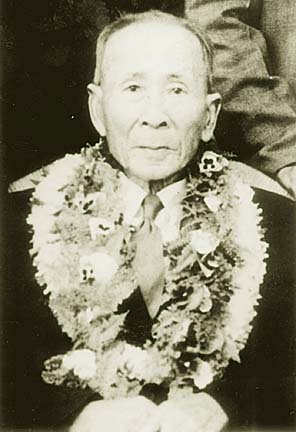


Tam Loo was born in Sam Chow, China, on Sept. 6, 1853. At age 34, he sailed on the cargo ship Quintua to work on a sugar plantation in Kuiaha, Maui. He met and married Hoinele Kaupena, who bore him three sons. Immigrant leaves
300 descendantsREADER REMEMBRANCE
Patricia Chang / Special to the Star-Bulletin
Being married to someone of Hawaiian ancestry, he was able to acquire land in Omaopio, Kula, where he established a farm. He grew vegetables and raised cows, ducks, chickens, goats, horses, pigs, dogs and turkeys.
When the boys were young, their mother died, leaving behind a very stressful situation. As time went by, Grandpa decided to start a search to fill the shoes of his deceased wife. A close friend named Mr. Chang Lau helped to be a matchmaker. He and Grandpa's eldest son got on their horses and set off to find a woman who would accept this huge responsibility.
They brought a very young Hawaiian woman home to meet a very tall and stern Chinese man with three sons and a huge farm with a lot of work. It was "love at first sight," and the match was made. Rose Kealoha became Grandpa's second wife.
Through their marriage and 10 more children, the Tam Loo children numbered 13 altogether. Life was good for the second generation and stories of their childhood days brought humor and sometimes mysteries.
There's much they enjoy sharing with the third and fourth generations. Family records reveal eight generations now in existence, consisting of more than 300 descendants.
According to his children, Grandpa was a strict and hard-working person. The children were expected to do their chores on the farm as he wanted them to be done.
He trained his family to have good manners and to respect the elders, greeting them whenever they would meet and to serve hot tea when they came to visit. He never mastered English or Hawaiian, speaking mostly Chinese and "pidgin English."
Good at math and an expert with the use of an abacus, he ran a small grocery store in Wailuku after leaving the plantation. He served as president of the Tou Yee Kwock Society in Wailuku, now known as the Kwong Fook Tong Society. He was able to visit China, only to return to the Hawaii he loved and where he lived until he passed away at age 86 in 1939. At traditional Ching Ming services, with family and friends at his graveside in Waiehu, Maui, we greet him with a toast of whiskey, char siu, roast pork, fruits and flowers.
During a recent visit to China, I attempted to find the Tam Loo village in Sam Chow province. It no longer exists.
The old-time residents explained the village was long gone, others said the old province is under a new name. Most say construction of new high-rises buried the small town that I set out to seek, now part of the history of our family that began there 148 years ago.
Hawaii has long attracted immigrants, and the trend continued in the 1990s. The U.S. Census bureau estimates that 17 percent of the people living in Hawaii in 2000 were not born in the United States. Immigration tidbits
>> Of the 83 percent born in the United States, 68 percent were born in Hawaii.
>> About 34 percent of the foreign-born residents entered the state from 1990 to 2000, while 65 percent arrived before 1990, according to the Census 2000 Supplementary Survey.
>> More than 84 percent of all foreign-born residents came to Hawaii from Asia, by far the largest percentage by region. Another 5.6 percent came from Oceania.
>> Fifty-five percent of foreign-born residents had become naturalized U.S. citizens by 2000, while 45 percent were not citizens.
Source: U.S. Census 2000 Supplementary Survey, a monthly sample of households from November 1999 through December 2000. Populations in institutions and group quarters are excluded. The confidence rate in the data statewide is 90 percent.